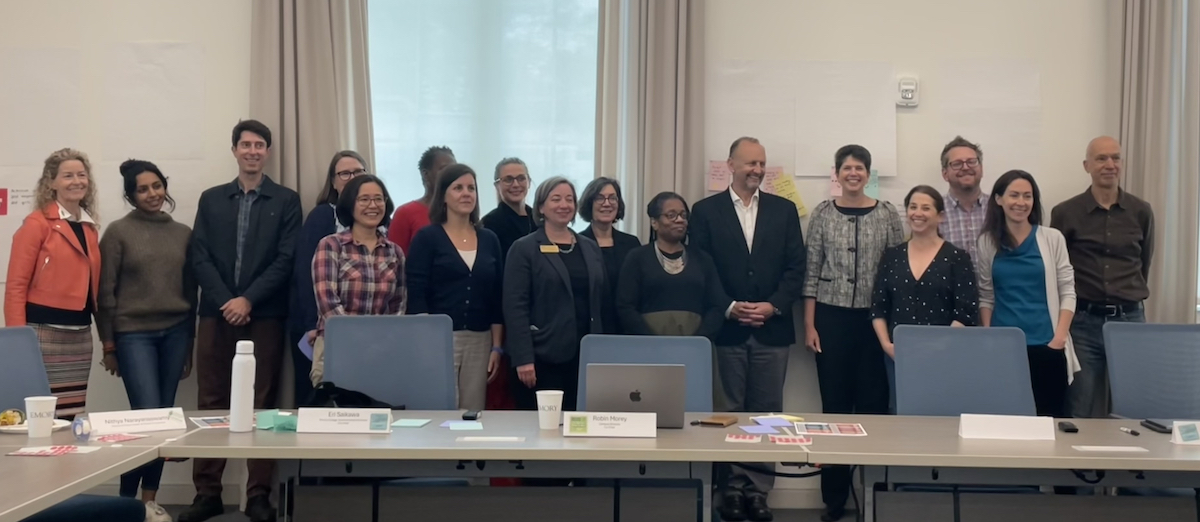Emory is crafting its newest sustainability vision for 2025-36, connecting campus and community sustainability goals to the global United Nations Sustainable Development Goals (SDGs) by using the framework as a guide for developing Emory-specific goals in alignment with the 17 SDGs.
Members of the Emory community are invited to add ideas and perspectives to the planning process in a variety of ways, including participating in a community input session, facilitating a conversation using the Sustainability Vision Conversation Guide and sharing input through the Sustainability Vision Input Platform.
Community priorities will be reviewed by the Sustainability Visioning Committee to craft the new sustainability vision.
The committee, co-chaired by Robin Morey, vice president of Campus Services and chief planning officer for Emory University and Emory Healthcare, and Eri Saikawa, Winship Distinguished Research Professor of Environmental Sciences in Emory College of Arts and Sciences, convened in January 2024 to assess progress made under the previous two sustainability visions and decide on the SDG framework to guide the upcoming vision.

Members of the Visioning Committee gathered to assess the progress made under the two previous sustainability visions and discuss the upcoming vision for 2025-36.
Saikawa adds, “The committee hopes to use our collective sustainability knowledge informed by the wide-ranging community input to identify the vision and goals that strengthen the local implementation of the UN SDGs and the One Emory priorities.”
The members of the Visioning Committee are:
- Co-chair: Robin Morey, vice president and chief planning officer, Campus Services
- Co-chair: Eri Saikawa, professor, Emory College of Arts and Sciences and Rollins School of Public Health
- Letitia Campbell, assistant professor, Candler School of Theology
- Lydia Marie Fort, assistant professor, Emory College of Arts and Sciences
- Mindy Goldstein, professor of practice and director of Turner Environmental Law Clinic, Emory School of Law
- Melissa Hage, professor of environmental science, Oxford College
- Tre’ Harp, III, student, Emory College of Arts and Sciences
- Carol Henderson, vice provost and chief diversity officer, Office of Diversity, Equity, and Inclusion
- Emery Hill, student, Emory College of Arts and Sciences
- Ciannat Howett, associate vice president, Campus Services
- Wesley Longhofer, associate professor, Goizueta Business School
- Catherine Maloney, chief operating officer, Emory Healthcare
- Hiram Maxim, professor, Emory College of Arts and Sciences
- Theresa Milazzo, vice president, Human Resources
- Nithya Narayanaswamy, student, Rollins School of Public Health
- Rebecca Philipsborn, assistant professor, School of Medicine
- Tom Rogers, professor, Emory College of Arts and Sciences
- Lisa Thompson, associate professor, Nell Hodgson Woodruff School of Nursing
- Lisa Underwood, associate vice president, Campus Services
- Alex Wan, assistant vice president, Office of Government and Community Affairs
- Lucy Williams, program manager, Planning, Design, and Construction, Campus Services
Bridging two decades of sustainability progress to a Vision for 2036
The sustainability culture, programming, infrastructure, coursework, research and community partnerships experienced on campus today have been shaped by two previous sustainability visions, the first adopted in 2006 when Emory University made sustainability an institutional priority and the second adopted in 2015.
“The two sustainability visions have guided institutional, departmental and individual decision-making in ways that measurably reduced the negative impacts of Emory’s operations and increased opportunities to learn from and engage with the campus and community in realizing the vision. By aligning the 2O36 vision with the UN SDGs, Emory is connecting the future of our campus and community to the global pursuit of a sustainable, equitable and resilient planet,” says Ciannat Howett, Emory’s associate vice president for Sustainability, Resilience and Economic Inclusion and adjunct associate professor.
Stay informed about input opportunities and the process on the Office of Sustainability Initiatives website, newsletter and social media.

